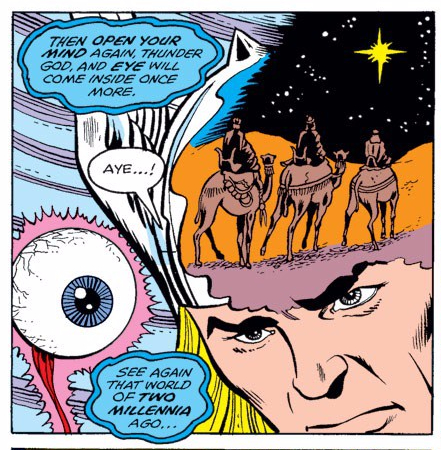I came across an article on the blog Science on Religion a little bit ago, and it made the argument about how powerfully destructive human reasoning can be. With our brains we humans have figured out great ways to ravage the land with ever-increasing efficiency and has pushed us to the environmental limits. Unmitigated, self-serving rationality can be destructive.
 The solution? The need for certain cultural axioms, assumed without or beyond reason, in particular the notion of the sacred. If it is taboo to say or do a certain thing, then your create an automatic cultural brake towards all sorts of potentially detrimental behaviors. Without these cultural axioms, all sorts of doom can be expected.
The solution? The need for certain cultural axioms, assumed without or beyond reason, in particular the notion of the sacred. If it is taboo to say or do a certain thing, then your create an automatic cultural brake towards all sorts of potentially detrimental behaviors. Without these cultural axioms, all sorts of doom can be expected.
While thoughtfully written, with a few swipes at New Atheists and IFLS that seemed more obligatory than insightful, it left us to beg the question: which axioms or sacred beliefs? Because it seems that the author (a PhD candidate at Boston University) already has a set of goals in mind, which means he wants there to be some particular sacred beliefs in place. Not just any. Which is very much the case because some sacred beliefs would count exactly contrary to his own goals of planetary preservation.
There has been a fair bit of opposition to environmentalism by American Protestants, and that has been the case for quite some time. That seems to be in part because of the belief among some that it is the sacred duty to use all of the resources of the earth, that they were placed here for a purpose. The notion of “subduing the earth” is supposed to be derived from Genesis, and that this was in part a reason for a lack of Christian support for the environmental movement was argued by L.J. White (1967) “The historical roots of our ecological crisis”, Science 155:1203-7. Much research has gone into this question, and it is still generally the case that some of the loudest opponents to combating climate change invoke biblical reasoning. So it seems that the cultural axiom of “subduing the earth” for its natural treasures is leading to exactly the sorts of doom that pure reason was supposed to have done.
So how are we supposed to get the right cultural axioms? If reason is off the table, we are left with what, religious authorities? Straight-up priestcraft? This sounds more like snobbish elitism trying to control the (reasonable?) masses.
Moreover, since all cultural groups, religious or otherwise, are going to have their own notions of the sacred or what constitute their cultural axioms, how do they figure out what to do when those cultures interact? How does the environmental/hippie culture deal with the slash-and-burn earth-subduers? Another holy war or two? Because if reasoning cannot decide, then what is left besides violence (a point made in part by Hector Avalos in Fighting Words)?
All of this is premised on what seems to be an absurd position, that pure reason has only one goal and cares not for the consequences. It also fails to understand that reason is motivated by what we already value, and we can have conflicting values. Obviously we want to have nice things, but we also notice the negative side effects. I want chocolate cake, but I want to lose weight. I want to have a car, but I don’t want to contribute to eventual sea level rise. How do we find the right path? Well, shouldn’t we be reflecting on it and seeing what appears to be the best way forward? Shouldn’t we be using … reason?
Moreover, reasoning is the common currency we can use across cultures. It’s about finding common beliefs and goals and then using logic and evidence to get the globally desired result. Cultural axioms fail to do that for the very defining fact that they are culturally relative and not cross-cultural. That isn’t to say the process gets us to where we want in a timely or efficient manner. Humans tend to stink at the process, and our own tribalism gets in the way. We tend to use our reasoning all too often as rationalization for our sectarian beliefs or goals. That is rather apparent in the news with the Kim Davis court battles and her specious arguments for religious freedom to not do her constitutional duties. Her supposedly sacred beliefs and bad reasons are getting in the way. (And remember, the marriage debate only moved forward because we said the current definition of marriage wasn’t uncompromisingly sacred but was relative and malleable as it historically has been.)
The solution isn’t more balkinization of beliefs, it’s being better reasoners and defrocking bad arguments and political stances. It doesn’t matter what is the sacred belief because of the consequences of her actions. Making the marriage debate a taboo is simply to undermine justice and freedom.

Now, it is true that pure reason cannot tell us what our values ought to be. Reasoning needs premises. We might find out we have stored up in our heads inconsistent premises (which is almost certainly the case for all of us), but it is from there we winnow out a more consistent position. From this we do our meta-ethics. Not from fist-pounding at some alter of the sacred, bestowed with power by mere say-so.






 The solution? The need for certain cultural axioms, assumed without or beyond reason, in particular the notion of the sacred. If it is taboo to say or do a certain thing, then your create an automatic cultural brake towards all sorts of potentially detrimental behaviors. Without these cultural axioms, all sorts of doom can be expected.
The solution? The need for certain cultural axioms, assumed without or beyond reason, in particular the notion of the sacred. If it is taboo to say or do a certain thing, then your create an automatic cultural brake towards all sorts of potentially detrimental behaviors. Without these cultural axioms, all sorts of doom can be expected.
 I recently had the pleasure of having an interview/conversation on the subject of Big Bang Cosmology and the implications for the universe having an absolute beginning. The question is also wrapped up with theistic claims that a god is a necessary precursor to the universe (or not). Also, some will argue that the Big Bang is just the scientists’ way of avoiding the conclusion that God made everything.
I recently had the pleasure of having an interview/conversation on the subject of Big Bang Cosmology and the implications for the universe having an absolute beginning. The question is also wrapped up with theistic claims that a god is a necessary precursor to the universe (or not). Also, some will argue that the Big Bang is just the scientists’ way of avoiding the conclusion that God made everything. As has been
As has been  However, a recent biography by historian David Wootton,
However, a recent biography by historian David Wootton,